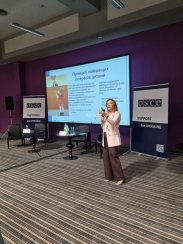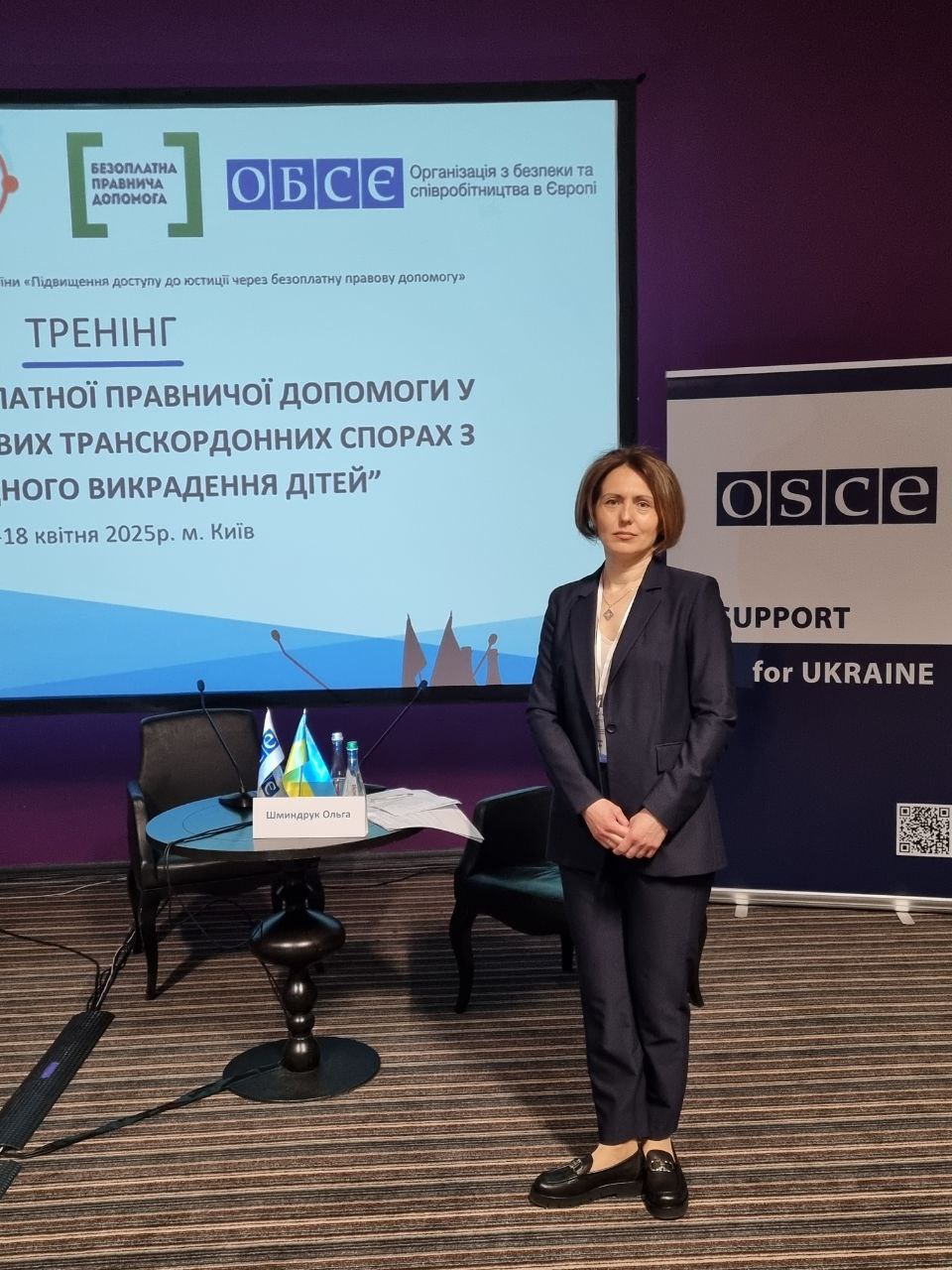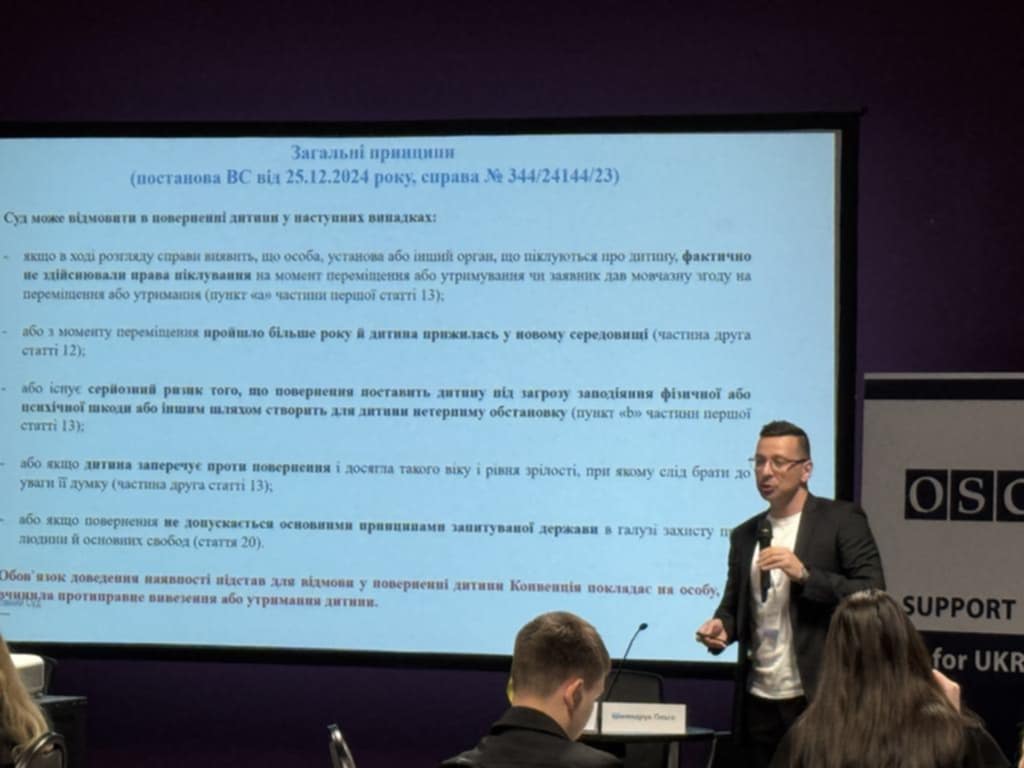Contact center of the Ukrainian Judiciary 044 207-35-46

Supreme Court judges in the Civil Cassation Court Olena Bilokon, Yuliia Cherniak and Pavlo Parkhomenko gave lectures to employees of free legal aid centres and defence lawyers as part of a training course on ‘Providing free legal aid in civil cross-border disputes involving international child abduction.’ The lecturers analysed the application in judicial practice of the Convention of 25 October 1980 on the Civil Aspects of International Child Abduction (the 1980 Hague Convention).
Olena Bilokon gave a lecture on “Protecting children's rights and taking into account the child's opinion when considering a case under the 1980 Hague Convention”.
She noted that the protection of children's rights is key in cases concerning their return to the place of their habitual residence, since the principle of acting in the best interests of the child in disputes concerning children is enshrined not only in the UN Convention on the Rights of the Child, but also in the 1980 Convention. This interpretation of the provisions of the Convention has been applied in a number of ECtHR judgments (of 26 November 2013 in the case of X v. Latvia) and in Supreme Court resolutions (resolution of the Grand Chamber of the Supreme Court of 13 April 2021 in case No. 2-4237/12, in which the court noted that that the non-return of a child may be justified in cases of serious risk of physical or mental harm to the child).
The best interests of the child are considered to be ensuring their development in a stable, safe and peaceful environment, maintaining ties with their family (provided that it is not dysfunctional). Sometimes the interests of the child may outweigh those of the parents, and this should be the priority in cases concerning their return.
One way of determining the best interests of the child in cases concerning his or her return to the country of habitual residence is to ascertain the child's opinion on the matter. The right of a child who is capable of forming his or her own views to express them freely on all matters affecting him or her is guaranteed by Article 12 of the UN Convention on the Rights of the Child and implemented in national legislation.
Articles 13 and 20 of the Hague Convention provide for exceptions under which the return of a child to his or her country of habitual residence may be refused, in particular if the child objects to the return and has attained an age and a degree of maturity at which his or her views are to be taken into account.
In case No. 461/9257/19 (resolution of 3 March 2021), the Civil Cassation Court of the Supreme Court noted that the refusal to take into account the child's objections to return, as well as the insufficient justification for such a decision, contradicts not only Article 13 of the Convention, but also Article 8 of the Convention for the Protection of Human Rights and Fundamental Freedoms. Also, in case No. 953/6251/21 (resolution of the Civil Cassation Court of the Supreme Court of 16 November 2022), it was emphasised that all circumstances, including the child's opinion, must be assessed as a whole in order to achieve a balance of interests.
The judge also drew attention to the methods of ascertaining the child's opinion. She noted that, in accordance with the Council of Europe Guidelines (para. 64, https://rm.coe.int/16804c2188), interviews and other forms of gathering information from children should be carried out by specially trained professionals in the most favourable conditions, taking into account the child's age, level of maturity and possible communication difficulties. The Civil Cassation Court of the Supreme Court of Ukraine, in its resolution of 25 September 2024 in case No. 522/10087/23, pointed to the possibility of involving a psychologist to obtain reliable information about the child's opinion. It is also permissible to ascertain the child's opinion through specialists from child welfare authorities, teachers or by obtaining testimony from the child themselves in court.
In assessing the child's opinion, his or her age and maturity are important. In its court decisions, the Supreme Court has noted that children under the age of five cannot usually be considered as those whose opinion is subject to legal consideration (resolutions of the Civil Cassation Court of the Supreme Court of 31 August 2022 in case No. 683/1084/21 and of 16 November 2022 in case No. 953/6251/21). At the same time, the courts analysed the opinion of children aged seven and older (resolutions of the Civil Cassation Court of the Supreme Court of 25 September 2024 in case No. 522/10087/23; of 20 January 2021 in case No. 754/11869/19; of 4 December 2019 in case No. 344/6360/17), taking into account their maturity.
Summing up, Olena Bilokon noted that the child's opinion is an important, but not the only factor to be taken into account when deciding on his or her return under the 1980 Hague Convention. However, such an opinion should be assessed with due regard to the child's age, level of maturity, independence of judgement and the circumstances in which it was expressed.

Yuliia Cherniak delivered a lecture on “Interpretation and Practice of Application of the 1980 Hague Convention: Key Legal Positions of the Supreme Court”.
First of all, the judge spoke about the interaction of the two most typical ways of protecting the rights of children and parents in case of moving a child abroad (or keeping him/her abroad) by one parent against the will of the other: filing a claim for the return of the child under the 1980 Hague Convention and filing a claim for determining the child's place of residence, which is covered by the subject matter of the 1996 Hague Convention on Parental Responsibility. The judge focused on the following issues on the basis of the Supreme Court resolutions in cases No. 545/2247/18, No. 367/1853/23, No. 757/54659/21-ц: a) whether a Ukrainian court can consider a case on determining the child's place of residence if there is an unenforced court decision to return the child from Ukraine to the state of the child's habitual residence in accordance with the Hague Convention of 1980; b) how the court should act if the courts are considering claims for determining the child's place of residence and for returning the child in accordance with this Convention; c) whether it is lawful to combine claims for determining the place of residence of children with their mother and for returning the children into one proceeding.
In her speech, the speaker emphasised the possibility of taking interim measures in disputes regarding the return of children illegally detained in a state other than the state of their habitual residence (Resolution of the Joint Chamber of the Civil Cassation Court of the Supreme Court of 14 February 2022 in case No. 754/7569/21) and special ways of securing a claim in this category of cases during martial law in Ukraine.
The speaker also addressed the issue of the circumstances that the Ukrainian court considers when deciding on a claim for the return of a child to Ukraine, taking into account the martial law of Ukraine. She emphasised that during martial law in Ukraine, the security situation and restrictions related to hostilities and their consequences are added to the subject of proof. In this regard, the provisions of Article 13(1)(b) of the 1980 Convention have become particularly relevant: “a judicial or administrative authority of the requested State shall not be obliged to order the return of a child if the person, institution or other authority opposing the return proves that there is a serious risk that the return would expose the child to physical or mental harm or otherwise create an intolerable environment for the child”. The Guide to Good Practice of the 1980 Convention on the Civil Aspects of International Child Abduction (chap. IV, para. 1(b)(1) Art. 13), adopted by the Hague Conference on Private International Law in 2000 and translated by the Supreme Court in 2022, is of considerable assistance in the correct application of this provision of the Convention (https://supreme.court.gov.ua/userfiles/media/new_folder_for_uploads/supreme/rizne/Konven_25_10_1980_vykr_ditei_1.pdf).
Yuliia Cherniak paid special attention to the issue of the ECHR case law in the Supreme Court resolutions in this category of cases, noting that according to the ECHR judgment of 6 July 2010 in the case of Neulinger and Shuruk v. Switzerland, the latter verifies the correct application of the 1980 Hague Convention in terms of compliance by national courts with the provisions of two articles of the Convention for the Protection of Human Rights and Fundamental Freedoms: Article 6 ‘Right to a Fair Trial’ and Article 8 ‘Right to Respect for Private and Family Life’. Studies by the Hague Conference on Private International Law point to the following two trends in the application of the 1980 Hague Convention: first, domestic violence is increasingly becoming a common background for international child abduction; second, the number of court decisions refusing to return a child is gradually increasing in most Contracting States. In this regard, the question of the correlation between refusal to return a child, in particular in accordance with Article 13(1)(b) of the 1980 Hague Convention, and interference with the right to respect for family life, as defined in Article 8(2) of the Convention for the Protection of Human Rights and Fundamental Freedoms, becomes particularly relevant. Yuliia Cherniak highlighted the legal position on this issue in detail on the example of the resolution of the Grand Chamber of the Supreme Court of 13 April 2021 in case No. 2-4237/12 and the resolution of the Civil Cassation Court of the Supreme Court of 4 October 2024 in case No. 334/5244/23 (on ensuring the return of a minor child to the French Republic).
Finally, the speaker described the role of the IHNJ (The International Hague Network of Judges) and emphasised the importance of mediation in the settlement of international family disputes.
Pavlo Parkhomenko delivered a lecture on "Peculiarities of the adjudication of cases of international child abduction on the basis of the Hague Convention of 1980".

The lecturer raised the issue of the correlation between the Convention and other international norms in the field of child protection. He drew attention to the ECHR case law, which states that the Convention must be applied in accordance with the principles of international law, in particular those relating to the international protection of human rights. The Court pointed out that the positive obligations imposed by Article 8 of the Convention for the Protection of Human Rights and Fundamental Freedoms on Contracting States in the case of reunification of a parent with his or her children should be interpreted in the light of the 1980 Hague Convention and the Convention on the Rights of the Child (paragraph 72 of the judgment in Maire v. Portugal) .
This approach encompasses the combined and harmonious application of international instruments, in particular, in this case, the Convention for the Protection of Human Rights and Fundamental Freedoms and the Hague Convention of 1980, taking into account its purpose and implications for the protection of the rights of children and parents.
Such consideration of international legal provisions should not lead to a conflict or opposition of different international treaties, provided that the Court can fulfil its task in full, namely “to ensure compliance with the obligations undertaken by the High Contracting Parties” to the Convention by interpreting and applying the provisions of the Convention in a manner that makes its guarantees practical and effective ( paras. 92, 94 of the judgment in X v. Latvia).
Pavlo Parkhomenko also spoke about the principle of ‘ensuring the best interests of the child’. He noted that the ECHR has developed two conditions that must be taken into account when determining the best interests of the child in each case: first, it is in the best interests of the child to maintain his or her ties with the family, unless the family is particularly unsuitable or manifestly dysfunctional; second, it is in the best interests of the child to ensure that he or she develops in a safe, secure and stable environment that is not dysfunctional (para. 100 of the Mamchur v. Ukraine judgment).
The judge said that pursuant to Article 3(1) of the UN Convention on the Rights of the Child, the child is entitled to have his or her best interests assessed and taken into account as a primary consideration in any action or decision taken in relation to him or her, whether in the public or private sphere. The lecturer drew attention to the resolution of the Civil Cassation Court of the Supreme Court of 4 August 2021 in case No. 654/4307/19, which concluded on the basic elements to be taken into account when assessing and determining the best interests of the child.
In its resolution dated 14 March 2025 in case No. 527/955/24, the Civil Cassation Court of the Supreme Court noted that the approach of the UN Committee on the Rights of the Child can serve as an algorithm for assessing and determining the best interests of the child, which should be applied in the following order: first, with due regard to the specific circumstances of the case, it is necessary to determine what the relevant elements of the best interests assessment are, fill them with specific content and determine the significance of each of them in relation to the others; second, for this purpose, it is necessary to comply with the rules that provide legal guarantees and proper implementation of this right.
The lecturer also paid attention to the issue of jurisdiction over cases with a foreign element. He reviewed the resolution of the Joint Chamber of the Civil Cassation Court of the Supreme Court of 11 December 2023 in case No. 607/20787/19, which concluded that the fact of a child's residence abroad does not affect the resolution of a dispute by the Ukrainian courts regarding the child's place of residence. And in its resolution dated 11 September 2024 in case No. 753/4392/23, the Civil Cassation Court of the Supreme Court concluded that the courts of previous instance failed to take into account the fact that at the time of consideration by the district court in Ukraine of the case on the removal of the child and returning him/her to the previous place of residence, the District Family Court of Frankfurt am Main was considering a case on child custody in a dispute between the same parties, on the same subject matter and on the same grounds. Therefore, the claim in this case should have been left without consideration in accordance with Article 255(1)(4) of the Civil Procedure Code of Ukraine and Article 75(3) of the Law of Ukraine ‘On Private International Law’.
The event was organised by the OSCE Support Programme for Ukraine in cooperation with the Coordination Centre for Legal Aid Provision and the Ministry of Justice of Ukraine.
Presentation by Olena Bilokon - https://cutt.ly/Trj1LlDU.
Presentation by Yuliia Cherniak – https://cutt.ly/vrj1zchr.
Presentation by Pavlo Parkhomenko – https://cutt.ly/2rj0wk8i .